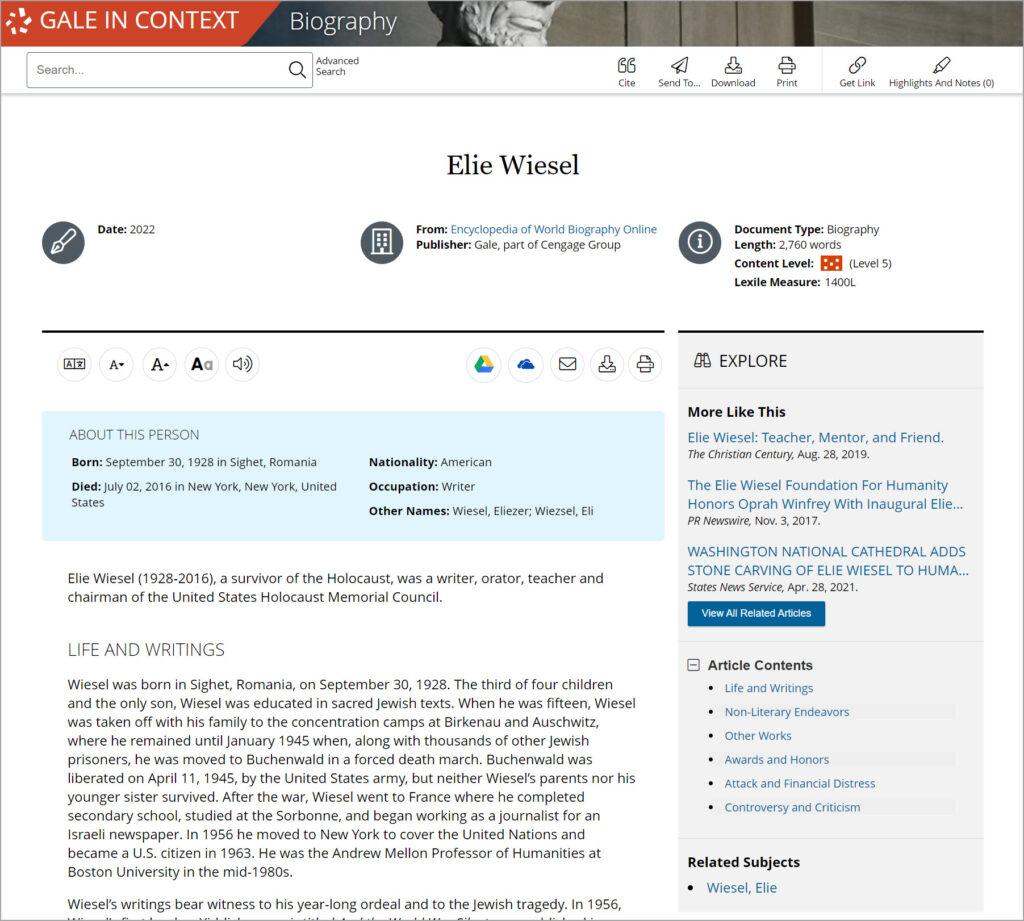| By Gale Staff |
Learning about the Holocaust is an opportunity to build personal awareness and spark critical thinking about the world around us. Educators may find that Holocaust Remembrance Day, observed this year on January 27, provides the chance to engage students with these challenging concepts. This April, with a little help from Gale In Context: Biography, some of the incredible stories of Holocaust survivors can be explored in the classroom.
Elie Wiesel
One of the best-known Holocaust survivors, Elie Wiesel, committed his life to preserving and honoring the stories of his people. Wiesel was only 15 when he was imprisoned in a concentration camp. Sadly, he lost several family members, including both of his parents, throughout the ordeal. After the camps were liberated in 1945, Wiesel continued his education, eventually becoming a successful journalist. He published a particularly influential memoir about his time in the concentration camp and went on to craft dozens of important written works about the Holocaust. He was a passionate advocate for human rights and served as an activist for oppressed peoples worldwide. In 1986, he was awarded the Nobel Peace Prize. Wiesel’s biography depicts a powerful story—despite his terrifying firsthand experience as a Holocaust survivor, he persevered and remained deeply compassionate about others.

Marek Edelman
Marek Edelman grew up in Warsaw, Poland. As a young man, despite not being a particularly committed student, he had earned a position within the local hospital, which allowed him some small freedoms when the Nazi occupation began in 1939. At age 20, after witnessing thousands of his Jewish neighbors rounded up and sent to concentration camps, he leveraged the small privilege of his position and helped start a resistance movement. In fact, he was a key leader during the Warsaw Ghetto Uprising in 1943. Famously, Edelman was instrumental in smuggling another resistance fighter, Jan Karski, into the ghetto to witness firsthand the terrible crimes of the Nazis. Karski went on the help debrief President Franklin D. Roosevelt on the situation and influenced the United States entering World War II. Edelman ultimately survived the Nazi regime and became a successful cardiologist, though he continued as an activist as well. His story demonstrates the power that small acts of resistance can have against injustice.
Ruth Westheimer
Dr. Ruth Westheimer is a trailblazer. She was a popular radio and television personality who advocated for sexual literacy during a time when most Americans weren’t comfortable being open about sex. While many are familiar with her provocative media content, they might not know that she was also a Holocaust survivor who lost both of her parents to concentration camps. Born Karola Ruth Siegel, she spent most of her teenage years in a Swiss orphanage. By her late teens, she had moved to Jerusalem to train as a sniper for a Jewish underground paramilitary organization. Besides becoming a celebrity, Dr. Ruth was a pillar for sexual health, taught at many prestigious institutions, and served in prominent organizations, including the Museum of Jewish Heritage memorial in New York City. Her story is captivating, and her sense of humor, despite the tragedies of her childhood, is exceptionally powerful.
Art Spiegelman
As a high school teacher, there’s a good chance that the name Art Spiegelman is familiar. His 1980s graphic novel, Maus, has been the target of much educational controversy, with some school boards going so far as to strike the work from their curricula. Art himself is a Pulitzer Prize-winning cartoonist. Born in 1948, he didn’t personally experience the Holocaust, but his novel instead tells his parents’ stories. Vladek and Anja Spiegelman were a very successful Jewish couple. But during the Nazi regime, they and their young son, Richieu, were sent to a concentration camp in Auschwitz, Poland. Richieu did not survive, but the parents incredibly made it through the ordeal. Nonetheless, the trauma from the concentration camp haunted the Spiegelmans for the rest of their lives. To capture and memorialize their experience, Art interviewed his own father and created Maus.
Gale In Context: Biography provides support for educators introducing this sensitive yet important topic. If your institution does not already subscribe to Biography, visit our website to learn more.

